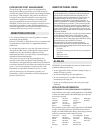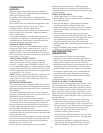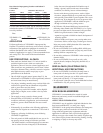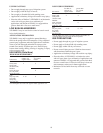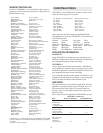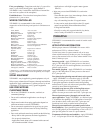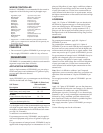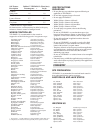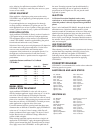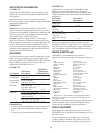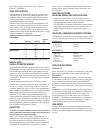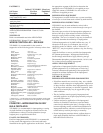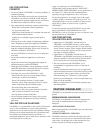
WEEDS CONTROLLED
DuPont™ VELPAR® L is recommended for the control or
s
uppression of the following weeds in pineapple crops:
* Suppression - a visible reduction in plant population and/or
plant vigor as compared to an untreated area and generally not
accepted as control.
USE PRECAUTIONS
PINEAPPLE
• Do not exceed 1.8 gallons VELPAR® L per acre per crop.
• Do not apply VELPAR® L within 181 days of harvest.
VELPAR® L is recommended for selective weed control in
sugarcane except in the State of Florida.
APPLICATION INFORMATION
Apply a single treatment of VELPAR® L per year using a
fixed-boom sprayer and a minimum of 25 gallons of spray
per acre unless otherwise directed.
HAWAII
Apply VELPAR® L pre- or postemergence at the following
rates for the indicated soil texture:
VELPAR® L (Pints/Acre)
Soil Texture (Plus surfactant
Description 0.25% by volume)
Coarse
Sand, loamy sand, sandy loam 1.8 – 3.5
Medium
Loam, silt loam, silty clay loam 1.8 – 7.0
F
ine
Cla
y, gray hydromorphic clay 7.0 – 14.5
Use the higher lev
els of the recommended dosage ranges on
soils high in organic matter. Do not apply more than twice
the highest recommended rate for the indicated soil texture
per crop (18–24 months).
A surfactant is recommended for all uses.
For preemergence use only, VELPAR® L may be applied
with aerial equipment using at least 10 gallons of spray per
acre.
For spot treatments of emerged weeds, VELPAR® L may be
applied with a knapsack sprayer in concentrations of 1.8–14
pints per 100 gallons of water. Apply a sufficient volume to
thoroughly wet weed foliage, but do not exceed 40 gallons
o
f spray per treated acre. Use the lower concentrations on
coarse-textured soils that are low in organic matter, and use
t
he higher concentrations on fine-textured soils that are high
in organic matter.
LOUISIANA
A
pply 1.8–3.5 pints of VELPAR® L per acre broadcast in
the fall before sugarcane emerges or in the spring before
active cane tillering begins. Fall treatments of 1.8–3 pints
per acre may be followed by a spring treatment of 1.8–3
pints per acre. Do not apply more than 6 pints per year. Use
the higher levels of the recommended dosage range on fine-
textured soils.
PUERTO RICO
For preemergence treatments, apply 0.9–1.8 pints of
VELPAR® L per acre.
For postemergence treatments, apply 0.9–1.8 pints of
VELPAR® L per acre to weeds after they have emerged. Use
the lower
rates on coarse-textured soils and the higher rates
on fine-textured soils (high in clay or organic matter). Each
ratoon may receive up to 1.8 pints of VELPAR® L per acre.
For spot treatment of emerged weeds, VELPAR® L may be
applied with a knapsack sprayer in concentrations of
0.9–1.8 pints per 100 gallons of water. Apply a sufficient
volume to wet the weed foliage. Do not exceed 100 gallons
of spray per treated acre. Use the lower concentration on
coarse-textured soils and the higher concentration on fine-
textured soils.
Note: Since it is difficult to calibrate “spot” knapsack
applications, extra care must be taken not to exceed the rate
equivalent of the maximum of 1.8 pints VELPAR® L per
acre.
Do not apply more than 3.6 pints of VELPAR® L per acre
per crop.
TEXAS
Apply 1.8–7 pints of VELPAR® L per acre. On plant cane,
apply the herbicide before the cane emerges or as a directed
layby treatment. On stubble cane, apply VELPAR® L
preemergence (up to the 3-leaf stage) or as a directed layby
treatment. A pre- or early postemergence treatment may be
followed by a layby treatment, provided at least 60 days
have elapsed and 3 inches of rainfall or sprinkler irrigation
have occurred since the first treatment.
Do not a
pply more than 7 pints of VELPAR® L per acre per
crop.
Use the following rates for the soil texture:
SUGARCANE
Ageratum, tropic Ageratum conycoides
Balsamapple Momordica charantia
Castorbean Ricinus communis
Crabgrass Digitaria spp
Crotalaria Crotolaria spp
Dallisgrass Paspalum dilatatum
Guineagrass Panicum maximum
Junglerice Echinochloa colonum
Kao haole* Leucaena glauca
Moana loa vine* Canavalia cathartica
Morningglory Ipomoea spp
Oxalis Oxalis spp
Popolo Solanum sandwicense
Richardsonium Richardsonia spp
Vaseygrass Paspalum urvillei
11



